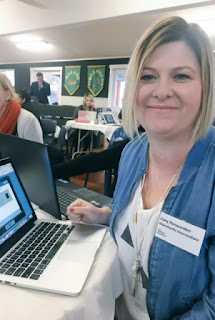Critical Self -Reflection:
As I set out on journey to do my Bachelor of Education in 2012, at a young age of 35 😉 I had no idea that this path would lead to me one of the best possible jobs in my life so far but also in doing so I would also learn so valuable lesson about myself, my experiences, attitudes, values and beliefs. Getting to
know myself, and appreciate my cultural identity has given me the confidence and security to create and maintain an accepting classroom environment. Russell Bishop (2012) explains this further in his Edtalks video, explaining that it it agentic teachers who "understand themselves and can weave together all those things that are necessary in classrooms, to create a learning context in the classroom where young Maori students can bring themselves to the learning conversation"
Which follows on to my next thought that cultural responsiveness is so much more than token gestures but a genuine understanding who the students are and what they bring to the classroom, including the families and wider community. Knowing the students you teach is equally as important and therefore relationships that foster trust and acceptance are essential, "but the caring environment needs to also express the belief that ethnicity should not limit an individuals potential for educational achievement or development" (Whyte, 2012).
School Practise:
Reflecting on questions from the
“Pasifika: Participation, Engagement, Achievement” tool.
Knowing your students is essential when it comes to planning and assessment. Our school involves families and parents with termly parent teacher meetings. During these meetings parents are able to support their child's goals and offer their own. In addition our school values our open door policy. We welcome families, community members, colleagues from other schools, beginning teachers into our school. We encourage these stakeholders to take part in surveys to guide us with our planning. At the same time we have robust systems in place to use assessment data to drive planning and teaching in the classroom. We engage in moderation activities and PLD to raise student achievement.
As a focus this year this is one are of teaching practise that we are developing at a increased pace to meet the diverse needs of the students in our school. We have been working towards be able to "plan activities and lessons to support diverse cultural backgrounds and languages" and "provide meaningful instructions that link to students prior experience/backgrounds" (n.d). Part of knowing your students is knowing how they learn. Research shows that students engage in authentic, relevant deep learning tasks. As part of our PLD this year we have been reading
A Rich Seam by Michael Fullen and we have been leading market spaces during our staff meetings/call back days.
References:
Edtalks.(2012, September 23). A culturally responsive pedagogy of relations. [video file].Retrieved from https://vimeo.com/49992994
Fullan, M., & Langworthy, M. A
Rich Seam: New Pedagogies Find Deep Learning. London: Pearson.
Te Toi Tupu. (n.d.). Pasifika: Participation, Engagement, Achievement tool. Retrieved from http://www.tetoitupu.org/pasifika-participation-engagement-achievement-tool
Whyte, B (2012). Cultrually Diverse Classrooms and
Communities. In C. McGee, & D. Fraser, The Professional Practise of
Teaching (pp. 224-244). Melbourne, Australia: Cengage Learning Australia.






















